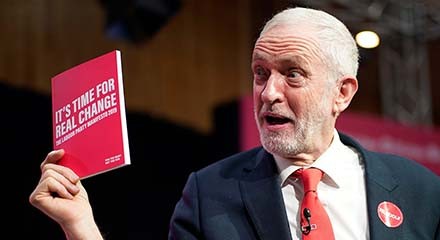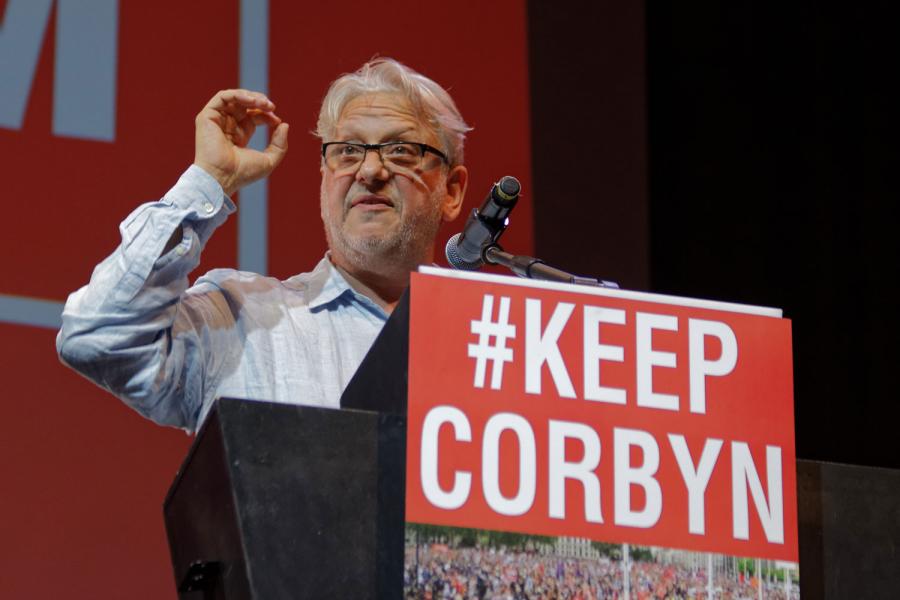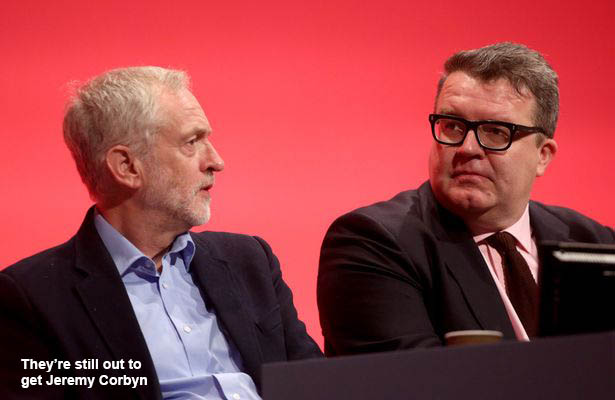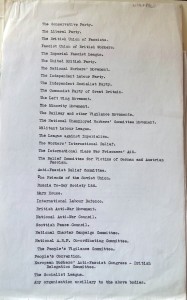Please note that not all of these will end up before delegates – some will be composited, others superseded by the Party Democracy Review. Click here to read our political assessment.
1. Battersea, referencing Chapter 1, Clause VIII, Section 1.G, The National Executive Committee, BAME rep, page 5 in existing rule book
Remove all of sub clause 1.G and replace with:
One member who self-defines as Black, Asian, Minority Ethnic (BAME) who shall be elected in a national one member one vote (OMOV) ballot of all BAME members. No elected member of the House of Commons, European Parliament, Scottish Parliament, Welsh Assembly shall be eligible to stand for this position.
Abstain
Our reason: Previously, the NEC BAME rep was elected by BAME Labour, which is a seriously rigged and undemocratic organisation (which is how Keith Vaz could get elected to the position as NEC representative). We would prefer to abolish this position altogether and instead increase the amount of NEC members elected by members in the branches and CLPs.
2. Tower Hamlets, referencing the same as 1.
Remove all of sub clause 1.G and replace with:
One member who self defines as Black, Asian, Minority Ethnic (BAME) who shall be elected in a national one member one vote (OMOV) ballot of all BAME members, plus one BAME member elected by trade union delegates to the BAME Labour Conference. No elected member of the House of Commons, European Parliament, Scottish Parliament, Welsh Assembly or a member of the House of Lords shall be eligible to stand for this position.
Abstain
Our reason: See 1.
3. Aylesbury and Walton, referencing Chapter 1, Clause VIII, section 1 F, The National Executive Committee, Youth Rep
Remove all of sub clause 1.F and replace with:
One young member of the party who is at the close of nominations under 25 years old and who shall be elected in a national one member one vote (OMOV) ballot of all members of Young Labour as defined by Chapter 1.II.2.F, plus one young member who is at the close of nominations under 25 years old elected by trade union delegates to the Young Labour Conference.
Vote Against
Our reason:We prefer the NEC member to be elected at a democratic conference of Young Labour, as this allows members to question the different candidates and makes them accountable to said body. This should be viewed together with the rule change from Stockport, which seeks to democratise Young Labour and its conference. Note that this rule change also wants to reduce the maximum age of Young Labour members to 25 from currently 27.
4. Garston and Halewood, referencing Chapter 1, Clause VIII, section 1 F, The National Executive Committee – Youth Rep, Page 5
Remove all of sub clause 1 F and replace with:
One young member of the Labour Party who is at the close of nominations under 27 years old will be elected in a national one member one vote (OMOV) ballot of all members of Young Labour as defined by Chapter 1.II.2.F, plus one young member who is at the close of nominations under 27 years old elected by trades union delegates to the Young Labour Conference.
Vote Against
Our reason: see above.
5. Carmarthen East & Dinefwr, Ceredigion, Swansea East referencing Chapter 1, Clause VIII, Section 1 H and I, Scottish and Welsh reps on the NEC, page 5
Remove all of sub clauses 1.H and I and replace with:
- One member of the Scottish Labour Party elected by the Scottish Labour Conference
- One member of the Welsh Labour Party, elected by the Welsh Labour Conference.
Vote For
Our reason:Just before the NEC shifted in favour of the left, the right majority pushed through a rule change that created two more seats on the NEC. This allowed the leader of the Scottish and Welsh Labour Party to choose an NEC member, who had to be “a front bench member” of the Scottish Parliament/the Welsh Assembly. This rule change tries to hand this power to the delegates at conference.
6. Mid Worcestershire, Rugby, Truro and Falmouth, Bexhill and Battle referencing Chapter 2, Clause I, Section 4.B, Conditions of Membership, page 10
Remove: ‘joins and/or supports a political organisation other than an official Labour group or other unit of the Party, or’
Vote For
Our reason: This rule had not been used for decades – until the election of a certain Jeremy Corbyn to leader of the Labour Party, that is. Since 2015 though, it has been liberally applied to “auto-exclude” dozens of supporters and alleged supporters of Socialist Appeal, the Alliance for Workers’ Liberty and Labour Party Marxists – many of whom had been active Labour Party members for many, many years. It was, for example, used to expel professor Moshé Machover after an article of his was published by Labour Party Marxists, which was handed out last year’s Labour Party conference (he has since been reinstated after an international outcry). It has also been used to auto-exclude people who have merely sharedarticles online published by the three organisations.
Members of Progress or Labour First – clearly very highly organised factions in the Labour Party – remain untouched. If applied consistently, the party would also have to expel supporters of the Stop the War Coalition or the Campaign for Nuclear Disarmament. But, of course, it has exclusivelybeen used against the organised left in the party. It is a McCarthyite anti-democratic rule that needs to go.
7. Broxtowe, referencing Chapter 2, Clause I, Section 4.B, Conditions ofMembership, page 10
Remove section B and replace with:
‘A member of the Party who joins and/ or supports a political organisation that is in conflict with the aims and principles of the Labour Party, or supports any candidate who stands against an official Labour candidate, or publicly declares their intent to stand against a Labour candidate, shall automatically be ineligible to be or remain a Party member, subject to the provisions of Chapter 6.I.2 below of the disciplinary rules.’
Vote Against
Our reason:This adds a few words to the first sentence: “that is in conflict with the aims and principles of the Labour Party”. This might have been inspired/pushed by Momentum, where Jon Lansman has made clear his opposition to rule change 6. This proposal begs the question as to how on earth you prove that the aims of an organisation are not “in conflict” with those of the Labour Party. This formulation has been used, for example, to expel supporters of Socialist Appeal, because they self-define as Marxist. The CND clearly wants to abolish all nuclear weapons; Jeremy Corbyn wants to rearm Trident – incompatible, surely? The amendment clarifies nothing.
8. Tewkesbury, referencing Chapter 2, Clause III, section 6, Membership Subscription fees, Page 13
Replace existing section 6 with:
An NEC approved statement shall be produced setting out the basis on which membership fees shall be allocated, including from January 2017 a minimum cash allocation of 50% of each paid up member’s subscription and a guaranteed minimum package of support for all CLPs.
Vote For
Our reason:Currently, CLPs are allocated a ‘minimum’ of a measly £1.50 per member – per year! Clearly, an organisation that encourages local organisation and autonomy should allocate much more.
9. Copeland, referencing chapter 3, Clause I, Section B and C, Conference delegates, page 14
At the end of section B add:
Where there are an odd number of delegates appointed, or delegation sizes vary year on year, a CLP will be required to make 50% of their delegates female over a four year period. A CLP may only send a delegation which is composed of more than 50% males, if doing so would not take them outside this rule. If a CLP is unable to find sufficient female delegates to comply with this rule, they will not be allowed to make up their delegation with males but will forfeit places. In exceptional circumstances, where the CLP can demonstrate they have made every effort to seek sufficient female delegates, conference arrangements committee may agree to allow a single male delegate to attend in year five; in all other cases the period will be extended to future conferences until such time as the average is 50% female.
At the end of section C add:
CLPs will be expected to alternate between male and female youth delegates
Vote Against
Our reason: The rules already states that, “at least every second delegate from a CLP shall be a woman”. While we encourage the participation of women on all levels of the party, this rule effectively punishes the CLP if it cannot find any female volunteers. It seems to us that this is a pseudo-democratic, unnecessary addition that makes the rule book even more unwieldy than it already is.
10. Islington North and South Derbyshire, referencing chapter 3, Clause III, Section 1, Procedural Rules for Conference, Page 15
Add additional Sub clause at the end of Section 1:
The NEC draw up Standing Orders for Party Conference that will outline procedures for: the conference timetable, procedure in debate, motions, composite motions, emergency motions, withdrawal and remittance of motions, reference back, point of order, chair’s ruling, suspension of Standing Orders, voting, including full procedures for card votes, ending debate and the role of the CAC. These Standing Orders will be presented to the first session of each Party Conference in a CAC report for agreement by the conference.
Vote For
Our reason: This is sorely lacking at present, as anybody who has attended conference will confirm. While each morning delegates and visitors wade through the huge pile of papers, composited motions and votes cast the previous day, the CAC plays hard and fast with conference standing orders (many which are not written down anywhere). It has a huge amount of power. It can decide, for example, if there should be a ‘hand vote’ or a ‘card vote’.
The unions and other affiliates have around 300 delegates at conference, while the CLPs have about 1,200. But in a card vote the affiliates’ vote counts for 50% of the total vote; ditto the CLPs’ vote (which is then further divided according to how many members a CLP has). Roughly, a union delegate’s vote counts for four times as much as the vote of a CLP delegate – and that can make all the difference in a dispute.
At the 2016 conference, for example, a huge row broke out at conference over the NEC’s “reform package” that snuck in two additional NEC seats for the leaders of Welsh and Scottish Labour. Delegates were on their feet, shouting “card vote, card vote” – but the chair simply refused and declared that the hand vote had “clearly won”. In a card vote, the result would have gone the other way, as the unions were firmly against the addition of two rightwingers.
11. Blackley and Broughton, Burnley, Filton and Bradley Stoke, Newport West, referencing chapter 3, Clause III, Section 2, Constitutional Amendments, page 13
Add Additional Sub clause at the end of Section 2:
All constitutional amendments submitted by affiliated organisations and CLPs that are accepted as in order shall be timetabled for debate at the first annual party conference following their submission.
Vote For
Our reason: The practice currently employed is actually not part of the rule book. It delays debate of constitutional amendments to the following year. An utterly unnecessary block to the democratic will of Labour Party members. Apparently, this was also discussed as part of the Democracy Review, but rejected by Katy Clark.
12. Beckenham, Brighton Pavilion, Hereford, Leyton & Wanstead, Solihull, referencing chapter 3, Clause III, Section 2. C Contemporary Motions Page 16
Delete the word ‘contemporary’ in the first sentence
.
Delete ‘determine whether the motions meet these criteria and’ from the second sentence.
Delete ‘which is not substantially addressed by reports of the NEC or NPF to conference’, replace with ‘on a matter of policy, campaigning or party organization and finance’
Second sentence: delete ‘determine whether the motions meet the criteria and’
Delete the word ‘contemporary’ in the last sentence
Vote For
Our reason: This is another rule change ‘left over’ from last year – and it should have been implemented a long time ago.Currently, the Conference Arrangements Committee and the NEC rule out tons of contemporary motions, because they deal with a subject that is mentioned in the overlong documents produced by the National Policy Forum. We are strongly against this outsourcing of policy-making to an untransparent and unwieldy forum like the NPF. Conference must become the supreme body of the party. The NPF is nothing but a pseudo-democratic device – invented by Tony Blair, of course – and should be abolished.
13. Washington & Sunderland West and 19 other CLPs, referencing chapter 4, Clause II, Section 2, B.i Election of Leader and Deputy Leader Nominations, page 18
Delete part of first sentence:
‘by 15 per cent of the combined Commons members of the PLP and members of the EPLP’
Replace with
‘by nominations from: a) 15 per cent of the combined Commons members of the PLP and members of the EPLP; or b) 15 per cent of the affiliated national trade unions; or c) 15 per cent of Constituency Labour Parties’
Vote Against
Our reason: This still gives parliamentarians too much power. There is a better proposal coming up in the Party Democracy Review, so this rule change will hopefully be superseded: This envisagesthat all candidates would have “to secure the support of 10% of trade unions, MPs orparty members, plus 5% of each of the other groups”, as The Guardianreports the leak. Though Marxists actually favour doing away with any threshold altogether – it should be up to the members to decide.
14. Edmonton, referencing chapter 4, Clause II, Section 2, B.i Election of Leader and Deputy Leader Nominations, page 18
At the end of the sentence
‘15 per cent of the combined Commons members of the PLP and members of the EPLP’
Add
‘and Constituency Labour Parties’
Vote Against
Our reason: see rule change 13
15. Wirral West, referencing Chapter 4, Clause II, Section 2. A, Election of Deputy Leader, page 18
Remove
‘Deputy Leader’ and replace with ‘2 Deputy Leaders’.
At the end of the sub clause add the sentence
‘At least one Deputy Leader must be a woman’
Abstain
Our reason:We have sympathy for this rule change, which is clearly designed to curb the power of Tom Watson. But we are in favour of doing away with the position of deputy leader altogether. Incidentally, we are also in favour of doing away with the position of leader, as there are serious issues of how members can effectively hold somebody in such a strong position to account.
16. Hornsey & Wood Green, referencing chapter 4, Clause II, Section 2. A, Election of Deputy Leader, Page 18
After sub clause 2. A add:
At all times subsequent to the 2020 General Election, or earlier if a vacancy arises, at least one of the two positions of leader and deputy leader will be occupied by a woman. If the position of Deputy Leader is held by a man, and a leadership election is required for any reason, Leader and Deputy leader nominations and elections will be held simultaneously.
The existing male deputy leader will only be eligible for re-election if the elected leader is a woman. He will be deemed to have resigned at the point of the declaration of the Leader election, unless the elected leader is a woman.
At the end of 2.B I add:
In the event of an election for deputy leader consequent on the requirement for at least one woman in the leadership, if at the close of the nomination period all candidates for Deputy Leader are male, nominations will be reopened with a threshold of 5% of the Commons members of the PLP. If after the close of such nomination period, there are no women nominations, nominations will reopen with self-nomination from members of the PLP.
At the beginning of 2 C iii add:
Votes will be counted first for Leader. If a man is declared elected, the first preference votes for any man in the Deputy Leadership election will be disregarded.
The second preference votes of those male candidates will be redistributed immediately and considered in the first round of counting. If a woman is elected leader, all votes and candidates will be counted in the Deputy Leader election.
Vote Against
Our reason: see above – plus, this suggested rule change is unnecessarily complicated and long-winded.
17. Kingswood, referencing chapter 4, Clause II, Section C. vi, Voting-Registered Supporters, page 19
Remove the phrase ‘registered supporters’
Remove all other references to registered supporters in rule book.
Vote For
Our reason: This was referenced back last year in favour of the Party Democracy Review – as it is listed again, we presume this issue is not covered by the recommendations of the Review. We are against the Americanisation of politics and would argue for Labour Party members only to have a vote.
18. Canterbury,Leeds North West, Newark, Southampton Test, Stockton South, referencing chapter 4, Clause II, Section 4, Election of General Secretary, page 20
Delete section 4.A. and replace with
The General Secretary of the Party shall be elected in accordance with the provisions set out below for a term of up to 3 years, at the discretion of the NEC. The General Secretary shall be accountable to the NEC for the implementation of its decisions and the management of all Labour Party staff. The NEC shall have the power to terminate the employment of the General Secretary, provided that its decision is supported by an absolute majority of its members.
The first election under these rules shall be initiated no more than one year and eight months after this rule is introduced when the General Secretary at that time shall be entitled to apply and, if s/he does so, shall be entitled to be included as a candidate in the ballot. Thereafter, no later than 2 years and eight months after the previous election of the general secretary, and in the event of a casual vacancy or a decision to give notice of the termination of the appointment of the current general secretary, the NEC shall initiate the process for electing a general secretary.
In order to ensure a wide choice of applicants, all NEC members may choose up to 4 applicants for interview, at least two of whom shall be women, and the eight candidates with the most support shall be interviewed. Following the interviews, all NEC members may support two candidates, one of whom must be a woman, of whom the top four shall go forward to a national one member one vote (OMOV) ballot of all members of the party to be conducted in line with guidelines issued by the NEC.
The candidate with the most votes in that ballot shall be declared elected General Secretary at the subsequent Party conference and shall be an ex-officio member of Party conference. S/he shall devote her or his whole time to the work of the Party and shall not be eligible to act as a parliamentary candidate. Should a vacancy in the office occur, for whatever reason, between Party conferences, the NEC shall have full power to fill the vacancy on a temporary basis pending the outcome of a new election. And the NEC shall make necessary consequential amendments.
Vote Against
Our reason: We have a lot of sympathy for this rule change, which has no doubt been inspired by the disastrous reign of Iain McNicol. He had to be bribed out of his job after undermining Jeremy Corbyn for two long years, during which he was responsible for facilitating the witch-hunt against thousands of Corbyn supporters, creating the hostile and fearful atmosphere we can still feel today.
Currently, the GS is elected at conference “at the recommendation of the NEC” and usually stays in the job until s/he dies or retires. We therefore welcome the fact that this rule change seeks to give the NEC the clear power to sack the GS, because that is clearly missing in the current rules. However, this also creates a certain democratic deficit: all party members can vote for the GS, but s/he could then be sacked by the NEC.
In our view, it would make more sense for the GS to be truly accountable to the NEC by being elected by this body too: it is, after all, the NEC that the GS is supposed to serve.
We also disagree with limiting the term to three years. If the person is doing a great job, why get rid of him or her? On the other hand, if s/he is terrible, s/he can be sacked straight away anyway. There is no point to this limit.
19. New Forest East, referencing chapter 4, Clause II, Section 4, Election of General Secretary, page 20
See rule change 16, but this envisages “… a term of up to 5 years” instead of 3 years.
Vote Against
Our reason: See above 18.
20. Swansea West, referencing chapter 4, Clause II, Section 8, Election of Leader and Deputy Leader of Welsh Labour Party, page 20
Remove sub clause 8.A and replace with
The Leader and Deputy Leader of Welsh Labour shall be elected by a one member one vote (OMOV) ballot of members in Wales conducted to procedures laid down by the Welsh Executive Committee.
Vote Against
Our reason: Again, we have a lot of sympathy with the motives behind this rule change: a truly undemocratic weighted electoral college, adopted only recently by the Welsh executive committee, has led to the election of Carolyn Harris MP, who is deeply unpopular among individual Labour Party members (but was favoured by the unions and elected representatives). But if there has to be a position of ‘leader’ – a position we think should be abolished – we would prefer this person to be elected by the (democratically chosen) Welsh/Scottish executive directly. After all, s/he is supposed to be accountable to and recallable by that body.
21. Dartford, referencing chapter 4, Clause III, Section A.i.d, Election of NEC – local governance, page 21
Replace first sentence with:
Division IV (local governance) shall consist of four members from either the Association of Labour Councillors (‘ALC’), directly elected mayors, or elected Police Commissioners, at least two of whom shall be women.
Vote Against
Our reason: This rule change clearly comes from the right. Instead of doubling the figure from two to four, these NEC positions should be abolished altogether.
22. Sefton Central, referencing chapter 4, Clause III, Section C.i. a,b and c, Election of the NCC (national constitutional committee), Page 22
In sub clauses C(i) a, b and c delete
‘their delegations at Party conference on a card vote basis’
Replace with:
‘means of a one-member-one-vote postal ballot among all eligible individual members of the Party, conducted to guidelines laid down by the NEC’
Vote For
Our reason: The National Constitutional Committee is incredibly important in the ongoing civil war. This is where the NEC sends all disciplinary cases it does not want to deal with themselves. Ideally, it should be abolished. But, seeing as this is not an option, we agree with this reform, which takes away the right of the unions, cooperatives and socialist societies to chose who should judge over party members.
23. Manchester Gorton, referencing chapter 5, Clause IV, Selection of Westminster Parliamentary Candidates, page 27
insert New Sub clause after sub clause 1, to read:
The NEC’s procedural rules and guidelines for the selection of candidates for Westminster parliament elections shall include provision for party branches and affiliated organisations to both interview prospective candidates and make nominations to the long list. The drawing up of the final shortlist will give due cognisance to the weight of nominations each candidate receives.
Vote For
Our reason: This is mainly to do with by-elections, where time constraints are often used as a reason to ignore the nominations by branches. Currently, candidates can be nominated by most branches, but still excluded from the long list. However, this rule change is basically tinkering with a process that is wholly undemocratic. We hope that rule changes 22 and 24 will supersede this one.
24. Portsmouth North, Rochester & Strood, referencing chapter 5, Clause IV, Selection of Westminster Parliamentary Candidates, Point 5, page 28
Remove sub clause A and B and replace with
If the sitting MP wishes to stand for re-election the standard procedures for the selection of a Prospective Parliamentary Candidate shall be set in motion not later than 42 months after the last time the said Member of Parliament was elected to Parliament at a general election and before any scheduled or “snap” general election. The said Member of Parliament shall have equal selection rights to other potential candidates save for those outlined in paragraph.
The said Member of Parliament shall have the right to be included (irrespective of whether he/she has been nominated) on the shortlist of candidates from whom the selection of the Prospective Parliamentary Candidate shall be made
Vote For
Our reason: This rule change does away with the trigger ballot. It would establish the mandatory reselection of all parliamentary candidates, similar to rule change 24. We presume these two amendments will be composited.
25. West Lancashire, referencingchapter 5, Clause IV, Selection of Westminster Parliamentary Candidates, Point 5, page 28
In Section 5 remove all references to ‘trigger ballot’ and replace with the phrase ‘CLP re-selection ballot’
Remove text from Section B and replace with:
If the MP fails to win the trigger ballot, he/ she shall not be eligible for nomination for selection as the prospective parliamentary candidate, and s/he shall not be included in the shortlist of candidates from whom the selection shall be made.
Vote For
Our reason: This will hopefully be overtaken by the much more radical rule changes 22 and 24. If not, then we urge a vote in favour of this rule change, as currently a sitting MP is automatically included on the short list of candidates, even if they lose the trigger ballot.
26. Labour International, referencing chapter 5, Clause IV, Selection of Westminster Parliamentary Candidates, Point 5, page 28
Remove sub clauses 5 and 6 and replace with:
- Following an election for a Parliamentary constituency the procedure for selection of Westminster Parliamentary Candidates shall be as follows:If the CLP is not represented in Parliament by a member of the PLP, a timetable for selecting the next Westminster Parliamentary Candidate shall commence no sooner than six weeks after the election and complete no later than 12 months after the election.If a CLP is represented in Parliament by a member of the PLP, then a timetable for selecting the next Westminster Parliamentary Candidate shall commence no sooner than 36 months and complete no later than 48 months after the election. The sitting Member of Parliament shall be automatically included on the shortlist of candidates, unless they request to retire or resign from the PLP.
- The CLP Shortlisting Committee shall draw up a shortlist of interested candidates to present to all members of the CLP who are eligible to vote in accordance with Clause I.1.A above
Vote For
Our reason:This is very similar to rule change 22 and the two will probably be composited. It would enshrine a process of real mandatory reselection.
27. Worthing West, Bristol West, Hove, referencingchapter 5, Clause IV, Selection of Westminster Parliamentary Candidates, Point 5, page 28
Remove Section 5 and 6 and replace with:
- If a CLP is represented in Parliament by a member of the PLP, that MP shall indicate, no later than 30 months after the last general election, or by an earlier specified date if the NEC believes that there is a significant prospect of an early general election, whether or not s/he wishes to stand for re-election.
- A. If a sitting MP has not indicated by that date that s/he wishes to stand for re-election, if s/he has indicated s/he wishes to retire, or if there is no sitting Labour MP, the NEC shall agree a timetable for a selection process for that constituency, candidates shall be invited to express interest in the selection and a Shortlisting Committee shall be appointed in line with procedural guidance to be issued by the NEC.In line with that timetable, party units and affiliates may make nominations in accordance with NEC guidance, and in doing so may interview interested candidates or not as they see fit. Any decision to invite some of the interested candidates to interview by party units must be made at a meeting to which all members of that unit have been invited, in accordance with party rules and with an explanation of the decisions that will be made at it.After the closing date for nominations, the Shortlisting Committee shall present to all members of the CLP who are eligible to vote (in accordance with Clause I.1.A above) a shortlist of nominated candidates. That shortlist must reflect the requirements of the NEC to ensure that candidates are representative of our society in accordance with Clause I.E.i above, and be subject to the requirement that any candidate who has received nominations from party branches representing over half of the CLP membership, or from more than half the affiliates and party units other than branches shall be included, subject to meeting eligibility criteria.
- A. If a sitting MP has indicated by that date that s/he wishes to stand for re-election, the NEC shall agree a timetable for a selection process for that constituency, candidates shall be invited to express interest in the selection and a Shortlisting Committee shall be appointed in line with procedural guidance to be issued by the NEC.B. In line with that timetable, party units and affiliates may make a single nomination each in accordance with NEC guidance, and in doing so may interview interested candidates or not as they see fit. Any decision to shortlist some of the interested candidates for consideration by party units for nomination must be made at a meeting to which all members of that unit have been invited, in accordance with party rules and with an explanation of the decisions that will be made at it. Whether party units make nominations following interviews or based on candidates’ applications, the sitting MP must be considered alongside and on equal terms to other candidates. If party units choose not to invite other candidates, then the sitting MP shall not attend the nomination meeting.C. If the sitting MP receives both
- nominations from party branches with a combined membership of more than two thirds of the CLP membership, and
- nominations submitted by more than two thirds of the affiliates and party units other than branches submitting nominations,
then the sitting MP shall be automatically reselected. D. Where the sitting MP is not automatically reselected, the Shortlisting Committee shall present to all members of the CLP who are eligible to vote in accordance with Clause I.1.A above a shortlist of nominated candidates. That shortlist must reflect the requirements of the NEC to ensure that candidates are representative of our society in accordance with Clause I.E.i above, it must include the sitting MP and it must be subject to the requirement that any candidate who has received nominations either from party branches with a combined membership of more than one half of the CLP membership or from more than half of the affiliates and party units other than branches making nominations shall be included, subject to meeting eligibility criteria.E. If the said MP is not selected as the prospective parliamentary candidate s/he shall have the right of appeal to the NEC. The appeal can only be made on the grounds that the procedures laid down in the rules and the general provisions of the constitution, rules and standing orders have not been properly carried out. The NEC must receive the appeal by the date on which they consider endorsement of the parliamentary candidate for the constituency.
Vote Against
Our reason: This rule change might do away with the word ‘trigger ballot’, but not with the undemocratic concept. If a sitting MP receives more than 66% of nominations from party branches and affiliated organisations, the MP would automatically be reselected. Such a system would still hugely favour the sitting MP and could be easily rigged by affiliated unions and societies. Much better to have an open and democratic contest between all candidates, to be decided by Labour Party members – as envisaged by rule changes 22 and 24. It smacks of Momentum’s original plan to reform the trigger ballot (see article by Carla Roberts).
28. Hastings & Rye, Kensington, Rayleigh & Wickford, referencing chapter 5, Clause IV, Selection of Westminster Parliamentary Candidates, Point 5, page 28
Remove Section 5 A and B and replace with:
5. If the sitting MP wishes to stand for re-election the standard procedures for the selection of a Prospective Parliamentary Candidate shall be set in motion not later than 42 months after the last time the said Member of Parliament was elected to Parliament at a general election. If the nominations, by both party units and affiliates, are over 66% in favour of the sitting MP then the NEC has the authority to endorse the sitting MPs as the CLP’s prospective parliamentary candidate [in those cases where a CLP does not have a branch structure (in other words, does not have the usual structure of party units), the NEC will provide appropriate guidance].
6. The said Member of Parliament shall have the right to be included (irrespective of whether he/she has been nominated) on the shortlist of candidates from whom the selection of the Prospective Parliamentary Candidate shall be made.
Vote Against
Our reason: Shorter than rule change 25, but would still give the sitting MP a huge advantage over other candidates. Also smacks of Momentum’s original plan to reform the trigger ballot (see article by Carla Roberts).
29. Richmond Park, referencing chapter 5, Clause IV, Selection of Westminster Parliamentary Candidates, Point 5, page 28
At the start of Section 7 add:
CLPs have the right to decide whether or not to field a candidate to contest a Westminster parliamentary seat. Such a vote, if moved from the floor and seconded, is to be taken at the beginning of a selection meeting. Should the vote be passed, the selection meeting is concluded. This decision would be endorsed by the NEC, such endorsements would not be reasonably with-held. Should the vote fall, the meeting proceeds to the selection of candidates.
Vote For
Our reason: We presume that this rule change comes from the right and has been moved by people who argued to withdraw a Labour Party candidate in favour of Tory billionaire Zac Goldsmith, who was standing as an ‘independent’ candidate in a by-election in 2016, triggered by his resignation from the Conservatives in protest over their support for a third runway in Heathrow (he is now safely back in the Tory fold).
Nevertheless, it is entirely correct that local members should have the right to decide not just whothey want as their candidate – but also ifthey even want to stand somebody. In the past, local Labour Parties stood down in order to support a candidate from the Communist Party, for example.
30. Cheltenham, referencing chapter 5, Clause IV, Section 1, Selection of Westminster Parliamentary Candidates, page 28
Remove Section 1 and replace with:
Following a parliamentary election in constituencies that do not elect Labour MPs, all the relevant CLPs will choose and appoint a candidate for any future parliamentary election within six months of the date of the aforesaid parliamentary election. If the chosen candidate later withdraws for any reason, the CLP will choose and appoint another candidate within three months. These selections will be made according to the procedure described in paragraphs 5.IV.6 -7 and clause 5.I.
Vote Against
Our reason: There is currently no particular time frame for choosing candidates. Is it useful to have somebody in this position for over four and a half years? This rule change does not allow for the person to be replaced (unless s/he withdraws voluntarily).
31. Bracknell, referencing chapter 6, Clause 1, Section 2, Readmission to the party following Auto-
Exclusion, Page 31
Remove section 2 and replace with:
When there has either been a decision to expel a member, or an automatic exclusion has been agreed, the body making that decision (NEC or NCC) will at the time of the decision also specify a period of between one and five years which has to elapse before readmission will be considered. The member will be informed of the exclusion period and the reason for their exclusion. The CLP will also be similarly informed. An application for re-admission shall not normally be considered by the NEC until the specified minimum period has elapsed. When a person applies for re-admission to the Party following an expulsion by the NCC on whatever basis or by automatic exclusion under Chapter 2 4A above of the membership rules, the application shall be submitted to the NEC for consideration and decision. The decision of the NEC shall be binding on the individual concerned and on the CLP relevant to the application.
Vote For
Our reason:The current period following an expulsion or auto-exclusion is set at a fixed “minimum of five years”. This amendment would give the NEC the right to choose a shorter period. There would probably still be unfair and unjust expulsions, but this is slightly better than the status quo.
32. Stockport, referencing chapter 11, Clause V, Rules for Young Labour, Page 47
Add an additional sub clause 4, as follows:
Young Labour shall have its own constitution and standing orders, to be determined by the Young Labour AGM.
Vote For
Our reason: This amendment should have been discussed and agreed last year, but was referenced back in favour of the Party Democracy Review. So unless this proposal is superseded by democratic changes contained in Katy Clark’s recommendations, socialists should support.
33. City of Durham, referencing chapter 12, Clause I and IV, Rules for Local Campaign Forums, Page 52
In Chapter 12 remove all reference to ‘Local Campaign Forum’ and replace with ‘Local Government Committee’.
Remove sub clauses 1-4 in Clause IV and replace with:
- The membership of the Local Government Committee shall consist 75% of delegates from the local CLP(s) and 25% from affiliates. At least 50% of delegates from each group shall be women.
- Additionally, CLP campaign co-ordinators shall be ex officio members of the LGC. Any sitting MP, AM, MSP, MEP, PCC and / or PPC may attend their LGC. Where a Co-operative Party council exists for the area concerned and they sponsor candidates in local elections they shall be entitled to appoint a member to the LGC.
- The LGC shall meet at least four times per year with representatives of the Labour group where one exists.
Vote For
Our reason: This will probably be superseded by the Party Democracy Review, which wants to re-establish District Labour Parties and do away with LCFs altogether (though we do not yet know on what basis).
The current LCFs clearly need radical reforming: They are dominated by councillors and party officials and are little more than toothless debating chambers. They used to write the Labour group’s manifesto, but this has long been outsourced to the councillors themselves. We would prefer a much more thoroughgoing reform of this body though.






 Labour has not had an official list of proscribed organisations since 1973. In 1930, the party leadership produced its first ‘proscribed list’, squarely aimed at the Communist Party of Great Britain, which included organisations and unions influenced by the CPGB.
Labour has not had an official list of proscribed organisations since 1973. In 1930, the party leadership produced its first ‘proscribed list’, squarely aimed at the Communist Party of Great Britain, which included organisations and unions influenced by the CPGB.